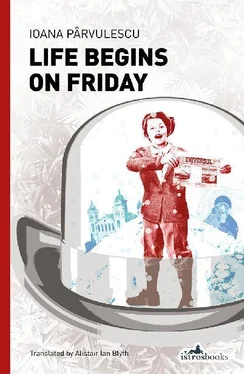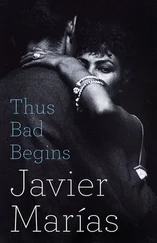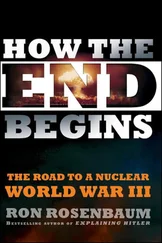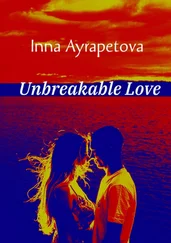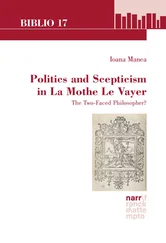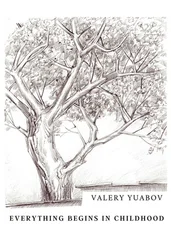Reinvigorated after his wash, Costache resumed his search, just as the bells chimed noon. He remembered that he had thought of talking in person to Epiharia, the woman from the Icoanei Church, because he did not wish to frighten her by inviting her to come to the Prefecture, but now it was too late to catch her at the service. He would look for her another day, he said to himself, since she attended church more punctually than a clerk at his office. He opened the catalogue again at the letter O and this time found an Oz and an M — probably another member of the family. He studied the monogram, recognized it, read the few lines that accompanied it, and got ready to go out. Firstly, he would go to the police station, to telephone 297. Ilie was on duty and to Costache fell the duty of going to the Filaret Station in time to catch the Giurgiu train.
*
When he discovered with whom he had the honour of talking, the stationmaster at Giurgiu straightened his back and directed him to the manor of Manolache Ochiu-Zănoagă, after placing at his disposal a good, rested, roan horse. Costache had not ridden very much lately, but now he felt the need to expend his energy. He felt young when he rode at a gallop. And he knew he would have to undergo a policeman’s hardest test: announcing a violent death to the family. He had chosen to perform this duty for a simple reason: he wished to find out what the young man’s last words might mean, the riddle that had been in his mind when he went to bed and again when he woke up. Unfortunately, he would have to take advantage of sudden grief, when people least guard their words. He arrived at half past four, just as the sun was setting.
Young aristocrat slain near Băneasa Forest . The editor-in-chief of Universul had got out of the habit of writing. He was the newspaper’s clear head, he verified, he rectified, but rarely did he take up his pen to write, and then only in exceptional circumstances. This was why he was pleased to come up with the headline from the very first, although he had wavered between boyar, nobleman, of good family and aristocrat , the latter word won in the end. That was what happened to him with headlines: either they presented themselves straight away or he could not hit on them at all, and then he would have to ask his colleagues’ advice. Păvălucă was the best at them: it was if he pulled them out of his sleeve, like a conjurer or a card sharp. But he had discovered two months ago that the man with whom he shared an office was writing a novel; which explained a lot. All he had managed to wrest from him was that it was set in the future or something of that sort. He suspected that it was an imitation of Jules Verne and he did not have very much faith in his colleague making a success of it.
He looked at the clock: it was barely ten in the morning. He had the whole day ahead of him; he had told his wife that he would be coming home for lunch at two. And so he dipped his nib and wrote. On 19 December, in our Friday issue, our Gazette published the news of an unknown man who had been found shot, but was alive… He paused and above the line, he added a still after the but . He continued the sentence: …but was still alive, near the Băneasa Forest. The young man was taken, according to an understanding with… he crossed out the with and changed it to between…an understanding between the Town Hall and Dr Rosemberg’s Hospice of Health… He crossed out the m and changed it to an n. Dr Rosenberg’s… It did not work. He crossed out the whole sentence and rewrote it, after which he pressed the blotter to it, rolling the wooden holder back and forth. As there is an understanding between the Town Hall and Dr Rosenberg, with regard to unidentified patients in need of medical treatment, the young man, in his death throes, was taken to the Hospice of h… he crossed out the h and made it a capital letter …Health, where every effort was made to… to… hmm, to help him . He stopped and reread what he had written. He blotted the ink once more and continued writing. But the throes of creation do not concern us here, they are far too intimate a matter, and so we shall look at the final result, the article on the first page of Universul , published on Monday, 22 December, a fair copy having been made and a vignette added the day before, at twenty to two on Sunday:
Young aristocrat slain near Băneasa Forest
On 19 December, in our Friday issue, our Gazette published the news of an unknown man who had been found shot, but was still alive, near the Băneasa Forest. As there is an understanding between the Town Hall and Dr Rosenberg, with regard to unidentified patients in need of medical treatment, the young man, in his death throes, was taken to the Hospice of Health, where every effort was made to help him. Notwithstanding, at eleven minutes past six on Saturday, the young man breathed his last. A special reporter from our newspaper witnessed the sad event. Because some of the young man’s items of clothing were embroidered with the monogram R. O. Z., Colonel Costache Boerescu, the eminent Chief of Public Security, managed to discover that the letters referred to the Ochiu-Zănoagă family from Giurgiu. Before breathing his last, the young man uttered a few words and a name. An investigation is in progress, but the Police have a lead, which, we hope, will lead to the murderer. It is possible that it was a duel with pistols, which is why we believe that the law against duelling proposed by Senator Viișoreanu will be adopted as soon as possible. We remind you that the Senator has proposed that the articles regarding duelling be struck from the Penal Code, which means that in the future duellists will be treated as common criminals and tried by jury.
Mr Procopiu spoke in the name of the newspaper, and so he did not sign his name to the article. Satisfied at having finished in time, he took his stovepipe hat, since he no longer had a bowler, and went down to the print shop to have the article replace the current front page. Then he went home with a hearty appetite, for he never fasted.
I dreamed that my soul had separated from my body. So much peace, so much solitude — and with those words I woke up. It is still dark and I can hear a crowing cock shattering the stillness of night. How has so much sadness coagulated within me? Whence all the strangeness from which we are made? Who guides us? It doesn’t take a great leap of imagination to see that such thoughts seem to obtrude from outside you rather than to rise from within, as if somebody injected them into you with an unseen needle. Maybe we ought to start from scratch and conceive of everything in a different way, if we are to understand it at all. Maybe we should take a different path, one nobody has ever taken, if we are to get to the core. What would we find, if we stopped couching everything in other people’s words and images? What if we thought with the whole of our bodies, rather than just a part of them? What would we remember about our past, our future? What would we make of the independent choices we have made? I keep thinking about the big question and my head strikes against a thick ceiling of silence. There is something that prevents me from talking intelligibly, even in the moments of grace when I understand. It lasts but an instant, no longer. How can anybody live when we all know … and when we all don’t know ? Can we even be sure we are alive?
In the room there is a fire and a bed, in which a man is asleep. The hotel is called the Frascati and is unfamiliar to me. A ‘colleague’ from the newspaper brought me here. What will my real colleagues be doing right now? In a register I wrote my name, profession and the city where I live, as the hotelier requested. Dan Crețu, journalist, Bucharest. It is true but even so it feels more and more a lie when I say that. Maybe I really will lose my mind, lying even as I tell the truth.
Читать дальше
